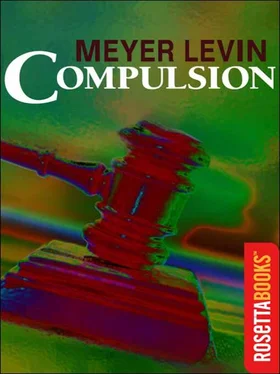Judd was trying to say something, but Artie called out, “I’m driving them to the inquest!” and zoomed off with us.
Paulie’s body had been moved to an undertaking parlour on Cottage Grove, a refined place with electric candelabra spaced along the walls. “This beats Balaban and Katz,” Artie whispered, yet with a proper note of commiseration under his remark. In a few moments he had crowded in among the police, among the reporters; he had gathered the arguments of the chief of detectives, who swore he would round up every known pervert in town, and he had caught the remarks of the chief of police, who maintained it was obviously a straight ransom job – there was no proof of perversion at all.
I was getting a little tired of Artie, his pitch of excitement was exhausting, and I felt relieved when his friend Judd suddenly appeared, pulling Artie aside. Presently Artie called to me, “See you tonight,” and they were gone.
The inquest itself only added to the uncertainty and hysteria. There were the identifications of the corpse by the uncle and the father, both of them controlled, unexpressive. There was the Polish workman who had found the body; he told nothing new. Then, importantly, his lips pursed over each statement, came Dr. Kruger to give the cause of death. Not the blows on the head, he declared, but suffocation. The tongue was swollen, and the throat. No marks of strangling. Suffocation. Perhaps from a gag. Death had occurred before nine o’clock. Previously, the victim had been subjected to an attack.
The word resounded. It was official now. A degenerate!
But immediately after Dr. Kruger, walking up hurriedly as if to correct a mistake, blurting his words before the questions could be asked, came a chemist, Dr. Haroutian, who had analysed the organs. There was no evidence of an attack, none at all, he declared.
Dr. Kruger leaped up, shouting. He had seen the body and if that wasn’t an attack -!
They began arguing about sphincters and muscle tension; it was too sad, too gruesome, and yet it seemed bitterly necessary to know just how, exactly how bestially some human had behaved. And as the argument grew, those who believed in the perversion became violently insistent, as though to exclude the evil of degeneracy would be virtually to condone the crime.
Both opinions had finally to be left in the record. Presently the inquest was over, and all of us, the reporters, were surging around the public officials, as though some extra word could settle what had happened to that poor boy on his way to his death.
With Harry Dawes of the Post , Tom and I traded details of our drugstore scoop in exchange for his story of a kid on Ellis Avenue who claimed he had seen Paulie get into a Winton car, a grey Winton.
But after we had phoned in and were sitting at a sandwich counter, Tom said it was clear that nobody knew a damn thing – we had done pretty well by ourselves so far; we would go off and work on our own. He kept speculating about the place itself, Hegewisch. All the kids who went to Twain had some time been out to that place. True, the science teachers who conducted the excursions had been cleared; they had airtight alibis. Still, by going out there we might get an idea.
It was a dreary nothing of an area, half swamp, half prairie, stretching from where the city left off, from streets of scattered frame cottages, out a few miles to where factory buildings began – steel mills and oil refineries. In walking over the ground, we first fully realized how far it was from where a car could park to where the body had been found. Had the boy walked? Willingly? Was it with someone he knew, who promised to show him something? Or had he been carried, already dead? Carried all this distance? And why, particularly, to be hidden in that culvert? We stood staring at the open cement pipe.
It seemed a haphazard choice, a wild, crazed choice, and yet there arose in me the tantalizing feeling of something unresolved that one experiences sometimes in the presence of the seemingly irrational. We speculated. Could the criminal be some poor local inhabitant who had picked up an acquaintance with the rich kids coming for their nature studies? Did people hang out here for anything? Fishing?
Strange how naked the area was only two days after the murder. Not even a policeman. But what would a cop be watching for, we kidded each other – the murderer’s return?
We decided to go back to the local police station. The captain himself, named Cleary, talked to us.
Well, he said, in summer kids went swimming there, and some guys went fishing, some of the Polacks, just for bluefish, and there was even a little rabbit hunting, but these Polacks around here were hard-working mill hands. Hell, in the first place none of them could even write a letter like that ransom letter.
Tom asked if there were any other teachers, besides those from the Twain School, who brought classes out there. Cleary said he didn’t know much about that; in fact, the prairie was officially outside his territory – it was state land, and the Forest Preserves had charge of it.
After we left, as it turned out, Captain Cleary telephoned a Forest Preserve guardian. He only wanted to protect himself. Captain Cleary asked the Forest Preserve man if he knew of any natural-history teachers, or specimen collectors, or anything like that, hanging around the Hegewisch wilds. And he got an answer. There was some bunch went out there on Sundays sometimes, Warden Gastony said; some lad brought them out there – he had his name down because the lad had a gun permit for shooting specimens. A millionaire’s kid by the name of Steiner – Judah Steiner, Jr., a real studious boy. Young Steiner would know what classes went out there.
Captain Cleary made a note of the name.
Coming home from the visit to Hegewisch, I saw Artie, driving along my street as though he had been lying in wait for me. He hailed me, waving a Globe , with our scoop about the drugstore. And he reminded me of out date.
I had really intended to forget about it; I always felt ill at ease when going out with rich guys, always felt they might suddenly drag the party to some place expensive. But now there was no getting out of it; Artie said he had run into Ruth on campus and told her.
Just when I was ready for the date, a call came from Tom. He was at the Bureau. A suicide had been found, at least a dead man, off the Oak Street Beach. And a typewritten letter had come to the police, confessing to the crime and saying, “When you get this I will be a dead man. I am very sorry I did this inhuman piece of work.” It was signed, “A Sorry Man.” Chief Nolan believed the note had been written on the ransom-note typewriter, and an expert was checking it. Tom was staying with the story at the Bureau, and if I wanted, I could go out to the suicide’s address; it was on West Madison. Sounded like a flophouse.
I called Artie, catching him at home. Perhaps he could pick up Ruth, and I would meet them later. Artie became intensely excited over the new clue. Sure, sure, he’d pick up Ruth; in fact, Judd didn’t have a date, so Judd could take care of Ruth for me. Why not let Judd pick up the girls, and he, Artie, would drive me over to West Madison Street on my story?
But I had had enough of Artie’s jittery intensity. I said he had better go fetch Ruth since she didn’t know Judd. Then I called her and joked about how this was what it would be like to be married to a newspaperman.
It was indeed a flophouse on West Madison. The manager, elderly and tired of everything, said, Nah, this John Doe had flopped there for a few days – nobody knew anything about him; there were no possessions. The cops had taken a couple of rags of shirts he had had there in a bag. As for his being the kidnapper, the murderer, “Hell, how could that bum have done it?” the manager said. “He was laying here all boozed up most of the time.”
Читать дальше












